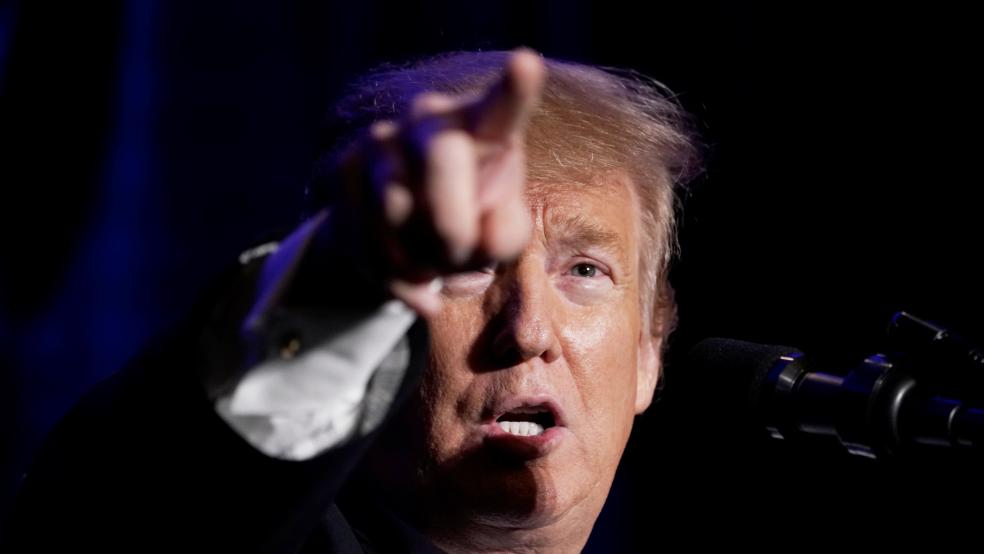Roses are red,
Violets are blue,
President Trump will sign the spending deal
and declare a national emergency too.
OK, it’s not the most romantic of gestures, but you could call it a Valentine’s Day gift of sorts for the American public: Congress is set to pass a massive 1,159-page spending deal that, once President Trump signs it, will end the threat of another government shutdown this fiscal year and close this chapter in the months-long impasse over border security funding — while immediately starting a new fight over presidential powers and his long-promised wall.
The $333 billion spending package, unveiled Wednesday just before midnight, means that the entire federal government will be funded through September. It provides $1.375 billion for 55 miles of new fences in Texas’s Rio Grande Valley, well shy of the $5.7 billion Trump had sought for 234 miles of barriers — and less than was available in deals considered before the five-week-long government shutdown.
The Senate passed the package in an 83-16 vote. The House is expected to follow suit Thursday night.
Some Late Drama
Trump had said he was unhappy with the compromise deal, and it wasn’t completely clear until mid-afternoon whether he would sign it, leaving GOP senators unsure about whether they’d have the president’s support. "One thousand pages filed in the in middle of the night take a little time to go through," a White House official told CNN.
After reviewing the deal with White House aides, Trump decided to support it and also declare a national emergency at the border. Senate Majority Leader Mitch McConnell announced the decision on the Senate floor, and White House Press Secretary Sarah Sanders confirmed it in a tweet.
As the White House was reviewing the deal, four high-profile new Democratic members of the House — Reps. Alexandria Ocasio-Cortez (NY), Ilhan Omar (MN), Rashida Tlaib (MI) and Ayanna Pressley (MA) — announced Thursday that they would not vote for the deal because it would increase funding for the Department of Homeland Security, in particular its Customs and Border Protection and Immigration and Customs Enforcement agencies.
“The Department of Homeland Security has separated thousands of children from their parents, denied asylum to those fleeing danger, and used taxpayers’ dollars as a slush fund to incite terror in immigrant communities," the lawmakers said in a statement.
Some conservatives also opposed the deal or objected to the rush to vote on a package lawmakers hadn’t had time to fully digest.
A New Phase in the Wall Fight
Trump’s decision means that the fight over funding for the president’s desired wall is about the enter a new phase, with legal challenges to the president’s declaration likely. “It’s not an emergency, what’s happening at the border,” House Speaker Nancy Pelosi said at an afternoon press conference. “The president is doing an end-run about Congress, about the power of the purse.”
Pelosi said that Democrats are reviewing their options.
What Else Is in the Spending Deal
While the border security measures in the deal have been the most contentious, the package also represents a broader rejection of Trump’s requested 2019 budget cuts. “An overview of the legislative package cites 84 instances were Congress allocated funds above the president’s budget request, for areas such as foreign aid, agricultural research, rural infrastructure, nutritional programs and climate research,” The Hill’s Jordain Carney and Niv Ellis note. “Only four areas have funding below the White House budget request.”
Per the Associated Press, the package includes:
Funding for an average of more than 45,000 detention beds for immigrants in the U.S. illegally, with financial flexibility to detain an even larger number.
- More than $1 billion for other aspects of border security, including surveillance equipment, customs officers, immigration judges and $414 million in humanitarian aid for detained immigrants
- A $1 billion increase in funding for the 2020 census
- A 4 percent budget increase for NASA
- $435 billion for a new Homeland Security Department to counter weapons of mass destruction
- $468 billion more to combat the opioid epidemic
- A 1.9 percent pay increase for federal workers, rebuffing Trump’s proposed pay freeze
You can find the official summary of the legislation here or see a shorter rundown of what made it in the bill and what got left out at The Hill.





